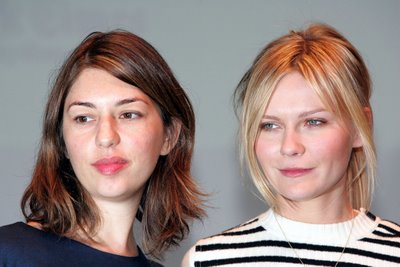
Let them read a few positive reviews of "Marie Antoinette", which were leaded to me by Penny Lane.
"The opening lines of “Natural’s Not in It,” by the Gang of Four, are the first words in Sofia Coppola’s “Marie Antoinette,” and they suggest one of that film’s paradoxical themes: The pursuit of sensual delight is trivial compared with other undertakings — just as “the problem of leisure” is surely more of a privilege than a burden — but pleasure is also serious, one of the things that gives life its shape and meaning.
It may be tempting to greet “Marie Antoinette” with a Jacobin snarl or a self-righteous sneer, since it is after all the story of the silly teenager who embodied a corrupt, absolutist state in its terminal decadence. But where’s the fun in such indignation? And, more seriously, where is the justice? To say that this movie is historically irresponsible or politically suspect is both to state the obvious and to miss the point. [...]
It would be overstating the case to call it a work of social criticism, but beneath its highly decorated surface is an examination, touched with melancholy as well as delight, of what it means to live in a world governed by rituals of acquisition and display. It is a world that Ms. Coppola presents as exotic and unreal — a baroque counterpart to the Tokyo of “Lost in Translation” — but that is not as far away as it first seems.
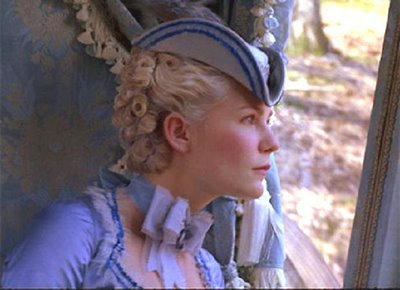
Ms. Coppola, who drew upon Antonia Fraser’s revisionist biography of Marie Antoinette, “Marie Antoinette: The Journey,” in preparing her script, is less a historian than a pop anthropologist, and her portrait of the young queen, played with wily charm by Kirsten Dunst, is not so much a psychological portrait as a tableau of mood and atmosphere. Highly theatrical and yet also intimate and informal, “Marie Antoinette” lets its story slink almost casually through its lovingly composed and rendered images.
The costumes, designed by Milena Canonero, are arresting; K K Barrett’s production design is appropriately sumptuous; and Lance Acord’s cinematography catches both the swirls of high-fashion color and the quieter, candlelighted tones of the French court. No mere backdrop, Versailles, where much of “Marie Antoinette” was shot, is the film’s subject and, in some respects, its star. Like Hollywood — which it resembles in some interesting and hardly accidental particulars — Versailles is a place with an aura and a power of its own, with an almost mystical ability to warp the lives of those who, by accident or choice, come to dwell on its grounds. [...]
Molly Shannon and Shirley Henderson are two of the principal mean girls of Versailles, and their chosen scapegoat is the elder Louis’s mistress, Madame du Barry (Asia Argento), who is also Marie’s rival for influence at court. The mingling of private matters with affairs of state is a hallmark of this kind of monarchy, and in Ms. Coppola’s hands the analogies to modern celebrity culture are simultaneously clear and subtle. Marie’s life is one of obscene entitlement, but it is also heavily constrained, and the story the film tells is of her efforts to accommodate her headstrong, spirited individualism to the strictures of her role as queen.
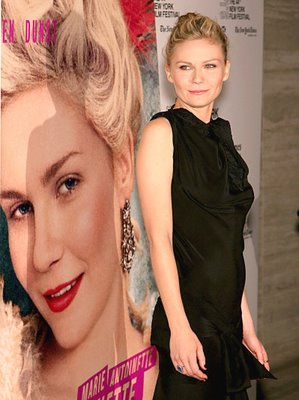
She is profligate and self-indulgent, yes, impetuously ordering up shoes, parties and impromptu trips to Paris. She breaks with tradition by applauding at the opera, and then appears onstage herself. She takes a lover — a dashing Swedish nobleman — and turns Petit Trianon, a royal retreat that was a gift from her husband, into a kind of Versailles V.I.P. room, where she drinks, gardens, reads Rousseau and plays shepherdess. These activities have often been mocked — and were the source of scandal and outrage in the years before the revolution — but through Ms. Coppola’s eyes they are poignant as well as a bit silly.
And the film’s visual extravagance somehow conveys its heroine’s loneliness as well as the sheer fun of aristocratic life. We know how this story ends, and Ms. Coppola refrains from showing us the violent particulars, or from sentimentalizing her heroine’s fate, preferring to conclude on a quiet, restrained note that registers the loss of Marie’s world as touchingly as the rest of the film has acknowledged her folly, her confusion and her humanity.
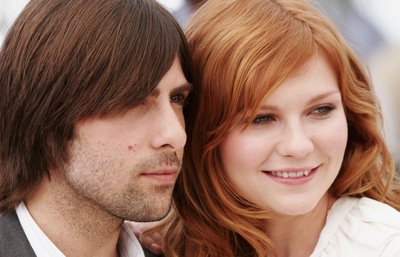
“Marie Antoinette” is rated PG-13 (Parents strongly cautioned). It has glimmers of sexuality and brief glimpses of naked flesh amid all the fabulous clothes."
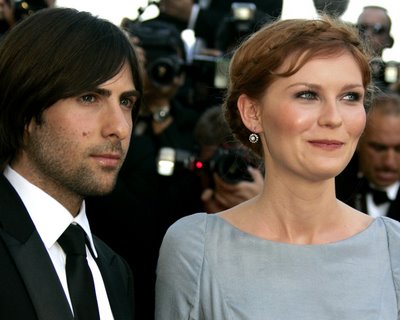
MOST HELPFUL READER REVIEW
people are missing the point, May 29, 2006
Reviewer: mcvarmazi
to those that expected your standard historical costume drama -- you missed the point. coppola said, and it is clear by her methods, that she was not trying to recreate a historical documentary of the time. her use of glam rock and contemporary sounding dialogue helped marie-antoinette and her entourage transcend the stuffy, stifled language that often kills movies with any historical background. they transcended what we usually think of as late 1700s aristocracy -- we saw them as characters with their follies, we understood their downfall as people and not as historical figures. yes, sofia coppola could have made just another historical drama, she could have given the revolution a fleshed-out background, but the movie is not about france or the revolution, it's marie-antoinette, the girl, her follies, her downfall. yes, people are products of their times, but it's a far more interesting creative experiment to examine a person in a fresh perspective. in this aspect, coppola's film was remarkably successful. if you're unwilling to view marie-antoinette from a new and different angle, you will find the purposeful decontexualization of her character unsettling and distracting. for the rest of us, it was a beautiful and creative romp. brava ms coppola! Source: New York Times Movies

"Dunst is perhaps the only possible casting for the young heroine: an intelligent, biddable young woman who glides through what is expected of her, irreproachably charming of dress and manner, and for whom dissent is restricted to a quizzical half-smile and elevation of the eyebrows. She is the new kid at Versailles High, weirded out by the local cliques and always on the point of saying out loud: "Like, hello?" Her only friend appears to be the ageing King Louis XV, lipsmackingly played by Rip Torn, and it seems at first as if Louis might even be Marie's Bill Murray-style confidant." Source: The Guardian
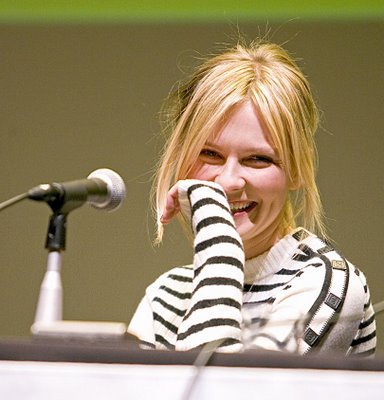 "Having now seen "Marie Antoinette" with expectations suitably managed, the royal we have four words for the haters:
"Having now seen "Marie Antoinette" with expectations suitably managed, the royal we have four words for the haters:Let them eat crow.
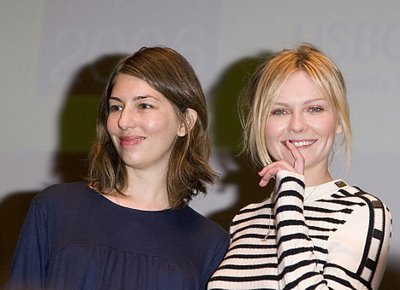
It turns out that "Marie Antoinette" may be the most fascinating cinematic Rorschach test to come down the pike (or land on the pike, as it were) in a long time. With "The Virgin Suicides" and "Lost in Translation," Coppola proved to be a gifted stylist with an unusual talent for evoking mood and atmosphere and emotional truth, but no one would have called those films particularly deep. [...]
By the time "Marie Antoinette" gets to its most notorious scene--an orgy of champagne, petits fours and shoes set to Bow Wow Wow's "I Want Candy"-- it's clear that Marie's famous appetite for baubles and bows was less the character flaw of a spoiled princess than a pathological response to the double bind of being both painfully isolated and claustrophobically scrutinized.
Following the lead of Antonia Fraser, upon whose 2001 biography "Marie Antoinette" is based, Coppola suggests that the queen was less a conspirator in the crimes of the Versailles court than a passive, inexperienced pawn of it, a sovereign whose only means to power was through pregnancy. Dunst's warm, spontaneous and exuberant portrayal allows viewers to sympathize, or at least better understand, what led this teenager to become the symbol for all that was morally and politically indefensible about pre-revolutionary France. [...]
People will come to "Marie Antoinette" with their own predispositions and will most likely leave with them intact; in all her work, Coppola invites the audience's projections with an unusually large and porous canvas. But those willing to take the film on its own terms will be confronted with a portrait that, while perhaps unsettling in its revisionist sympathies, offers a valid provocation at a time when Americans are debating the costs of isolation, both personal and political. Far from mere spectacle, "Marie Antoinette" is instead a slyly subversive film, seducing viewers with its endless montage of sumptuous excess, but also daring them to empathize with the girl drowning in it." Source The Washington Post
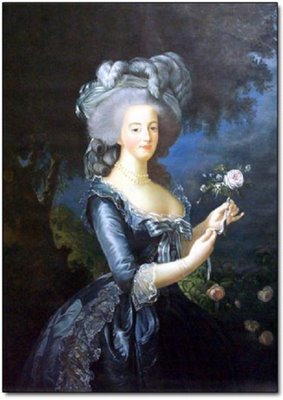 Source URL: https://americanendeavor.blogspot.com/2006/10/good-marie-antoinette-reviews_25.html
Source URL: https://americanendeavor.blogspot.com/2006/10/good-marie-antoinette-reviews_25.htmlVisit american endeavor for Daily Updated Hairstyles Collection








No comments:
Post a Comment